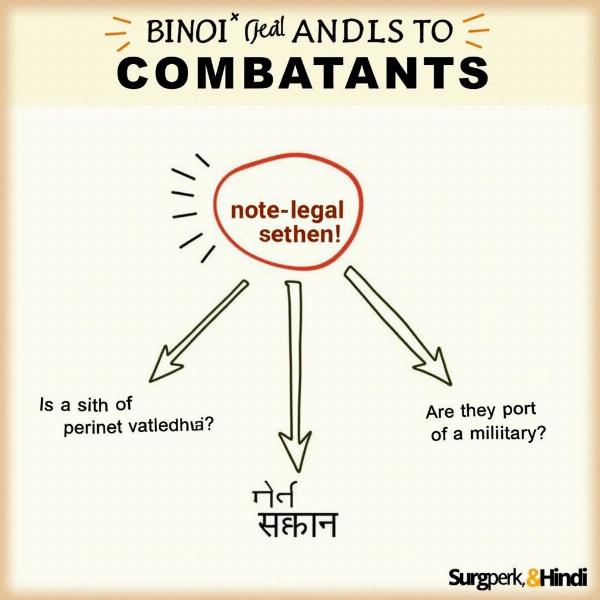Understanding the meaning of “combatants” in Hindi is crucial for anyone navigating legal, historical, or military texts. The word evokes images of conflict and struggle, and accurately translating it requires understanding its nuanced meanings in various contexts. This article delves into the different Hindi translations of “combatants,” explores their cultural significance, and provides practical examples to ensure a thorough understanding.
Exploring the Hindi Translations of “Combatants”
The most common Hindi translation for “combatants” is योध्दा (yoddhā). This word carries a strong sense of warriorhood and is often used in epic literature and historical accounts. It evokes bravery, skill, and a commitment to fighting. However, depending on the specific context, other translations can be more appropriate.
For instance, लड़ाका (laṛākā) is a more general term that simply means “fighter.” It can refer to anyone involved in a fight, regardless of their training or official status. This word is suitable for describing participants in a brawl or a street fight.
In legal and military contexts, लड़ाकू (laṛākū) is a more precise translation. It refers to someone actively engaged in combat as part of a military force. This distinction is crucial when discussing laws of war or analyzing military strategies.
Other related terms include सैनिक (sainik) meaning “soldier,” and विरोधी (virodhi) meaning “opponent” or “adversary.” These words offer further nuances depending on the specific context of the combat.
Cultural Significance of Combatants in India
India has a rich history of warrior traditions, reflected in its epics like the Mahabharata and Ramayana. These texts celebrate the courage and skill of warriors, highlighting their role in upholding dharma (righteousness). The concept of the Kshatriya, the warrior caste, further emphasizes the cultural significance of combatants in Indian society.
Practical Examples of “Combatants” in Hindi
To further clarify the usage of these translations, consider the following examples:
- The yoddhās fought bravely in the battle. (योध्दाओं ने युद्ध में बहादुरी से लड़ाई लड़ी।) – This sentence uses yoddhās to describe warriors in a formal, potentially historical context.
- The two laṛākās were separated by the police. (पुलिस ने दोनों लड़ाकों को अलग किया।) – Here, laṛākās refers to individuals involved in a less formal fight, possibly a street fight.
- The Geneva Convention protects the rights of laṛakū. (जिनेवा कन्वेंशन लड़ाकू के अधिकारों की रक्षा करता है।) – This sentence uses laṛakū in a legal context, referring to combatants under the laws of war.
How to Choose the Right Hindi Word for “Combatants”
Choosing the right Hindi word depends heavily on the context. Consider the nature of the conflict, the status of the individuals involved, and the overall tone of your writing. When in doubt, consulting a Hindi language expert can ensure accurate and culturally appropriate translation.
 Choosing the Right Hindi Word for "Combatants"
Choosing the Right Hindi Word for "Combatants"
Conclusion
Understanding the various Hindi translations of “combatants” is essential for effective communication. Whether you’re studying Indian history, analyzing military conflicts, or simply trying to understand a Hindi text, choosing the right word can significantly impact the meaning and clarity of your message. By considering the context and nuances of each term, you can ensure accurate and culturally sensitive translation.
FAQ
- What is the most common Hindi word for “combatants”? The most common word is योध्दा (yoddhā), meaning “warrior.”
- What is the difference between लड़ाका (laṛākā) and लड़ाकू (laṛakū)? लड़ाका (laṛākā) is a general term for “fighter,” while लड़ाकू (laṛakū) specifically refers to a combatant in a military context.
- How do I choose the right Hindi translation for “combatants”? Consider the context of the combat, the status of the fighters, and the overall tone of your writing.
- Where can I find more information about Hindi translations? Resources like Hindi dictionaries and online language forums can provide further assistance.
- Is it important to be culturally sensitive when translating “combatants”? Yes, understanding the cultural context of combat and warriorhood in India is crucial for accurate and respectful translation.
Meaning-Hindi.in is your one-stop solution for all your Hindi translation needs. We offer a wide range of services, from business and legal document translation to website localization and technical manual translation. Our team of expert linguists ensures accurate, culturally sensitive, and high-quality translations. Contact us today at [email protected] or +91 11-4502-7584 for a free quote. Meaning-Hindi.in is dedicated to bridging the language gap and facilitating seamless communication across cultures.